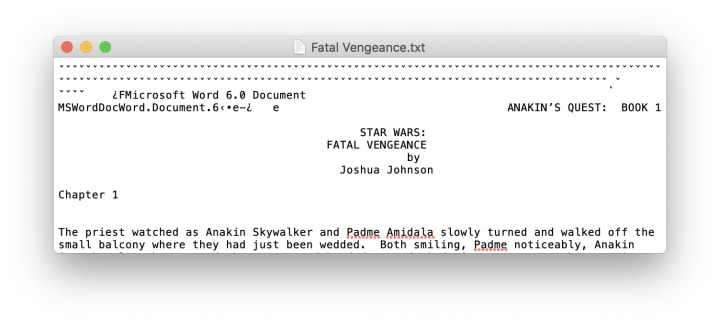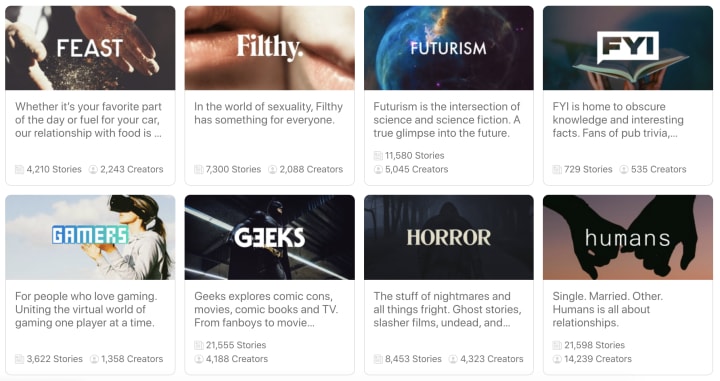Is Fan Fiction Even Legal? Should I Finally Publish My Star Wars Novella?
Vocal's head of Content Moderation takes a look at fan fiction — a thriving industry that occasionally skirts the line between enthusiasm and theft of intellectual property.

“Anakin,” she said as she turned to face him again. “What if we pretended that somebody tried to attack me or something. Then you would have to rush me off planet to keep me safe, right? Or what if I was called to a secret meeting somewhere; it would be your duty to take me there, wouldn’t it?”
“I couldn’t do that,” Anakin replied firmly. “My Master would know immediately if one of us were lying.”
Padme sighed with frustration. “Why did we even get married if we’ll never see each other?”
She wished she could jam the words back down her throat as she picked up the hurt expression on Anakin’s face.
“I thought,” he said quietly, “because we loved each other.”
“I’m sorry, Anakin,” she said as a wave of guilt came over her.
A young couple facing marital strife. A plot to use chemical warfare against the Jedi. A new dark Prince of the Sith. All this and more can be found in "Anakin's Quest: Book 1, Fatal Vengeance" penned in 2006 and available nowhere books are sold.

My 25,000 word Star Wars novella lives in only two places: my computer and a decades-old flash drive — a flash drive that also contains several other manuscripts from my childhood:
- "Anakin's Quest: Book 2" (Eternally unfinished.)
- "The Green Stone" (This wasn't fan fiction, but it might as well have been; the story is about two friends who travel across the world to keep a magical object out of the hands of evildoers. My apologies to Mr. Tolkien and his estate.)
- "Take Me With You" (A romance novel that climaxes [not that kind of romance novel] with a MURDER scene in which a jilted ex-lover strangles the protagonist with twine in the closet at a graduation party...)
There's a lot to unpack here, I know.
Out of everything I wrote, "Anakin's Quest" was my favorite. It's no surprise that this story flowed the fastest from brain to paper. Unburdened by the pressure to create my own complex characters and worlds to captivate readers, I was free to focus on the story alone.
Of course I'm talking about fan fiction.
Here at Vocal, we're big fans of fan fiction, and fan fiction is a big fan of us, because we give it a place to live. Typically, "fan fic" lives on our Geeks community, where we publish all things entertainment, comics, pop culture, and more (but if you're looking for Star Wars stuff, jump on over to Futurism.)
We love fan fic, but just because you love something doesn't necessarily make it legal. Well, if fan fiction is illegal, how can it exist in droves on the internet? Sure, there's a lot of illegal stuff online, but fan fic isn't buried on the Dark Web. It's right there in the open. One of the biggest fan fiction platforms is literally called fanfiction.net. How is that okay? After all, it doesn't take a deep understanding of copyright law to realize that using someone's intellectual property to tell widely varying and often extraordinarily compromising stories might be... well, unethical at best, right?
So what's the deal with fan fic?
Origins of Fan Fiction
Some argue that fan fic dates all the way back to the 1600s. It's a stretch, but the argument has been made that "Paradise Lost" was the first piece of fan fiction, taking characters and themes from the Bible and repurposing them to tell a vastly different story from the Word of the Lord. Outside of this example, however, most fan fic emergence took place in the 19th and 20th centuries, as iconic characters like Sherlock Holmes, iconic settings like Jane Austen's Pemberley Manor, and iconic worlds like Star Trek became the inspiration for generations of young creators. Within these realms, creativity truly knows no bounds. From "Pride, Prose, and Princes," (a Neopets-themed riff on the story of "Pride and Prejudice") to "Lord of the Scooby Snacks," if you've imagined it, it probably already exists.
In addition to creating a limitless supply of new content to feed hungry fandoms, the positive elements of fan fiction also include racial and ethnic inclusion, allowing die-hard fans to envision these beloved worlds with characters who look, act, and think like they do. The author of the afore-mentioned Neopets/Austenite mash-up is a first-generation American from Nigeria named Jordan Ifueko, who had this to say about the world of fan fiction:
“I loved stories that never loved me back,” [Ifueko] said. “For me to play pretend was very different than for a white girl to play pretend. I came up with elaborate backstories to explain why my character was brown.” Unlike her parents, who seemed to accept the colonialism of British stories, Ifueko felt a keen disappointment every time she searched for—and failed to find—heroines that looked like her.
It's also interesting to examine gender dynamics in the consumption of fan fiction, particularly romantic fan fiction. Romantic literature is a billion dollar industry, and according to data quoted by Shelly Jay at Nerdist.com, it has a consumer base that is 85% women. Regarding romantic fan fiction, Jay writes:
"... Unlike mainstream romance movies—which despite increased racial diversity still trend overwhelmingly heterosexual, white, and able-bodied—the romance [fan fiction] industry is prioritizing the love stories we usually don’t see on-screen."
Thanks, Internet authors!
Of course not all fan fic deserves a positive spin. It has a reputation for being dynamically subpar for an obvious reason: 99% of it is written by amateurs. Granted, there are a few professionals who engage in the art form. S.E. Hinton, Neil Gaiman, and a few other prominent writers have chosen not to hide their underbelly pastimes. Andy Weir (one of self-publishing's biggest success stories and bestselling author of "The Martian") actually wrote "Ready Player One" fan fic that was publicly accepted as canon in 2016.
In fact, the careers of several now-famous authors were kickstarted by the fan fic industry. E.L. James is the most noteworthy example, converting her Twilight fan fic into the bestselling series "Fifty Shades of Grey." Cassandra Clare, Marissa Meyer, and others were able to secure publishing deals due to their mountainous success on fanfiction.net, Archive of Our Own (AO3), and Wattpad. Attempting to follow in the footsteps of these ostensibly rare success stories, millions of writers and cult fans dream of one day selling the rights to their years-in-the-making "Bee Movie" erotic fan fiction. The tagline:
"She wants the B."
I swear, I can't make this stuff up.
While most fan fic should be disregarded by all but the most die-hard fans, there will always be those looking to profit from its undeniable success. Heck, WattPad even managed to take One Direction fan fic and land a production credit on the panned but highly profitable movie "After," as well as the sequel "After We Collided" co-starring Dylan Sprouse.
Suffice it to say, fan fic is everywhere. It's a booming industry. It's also a misunderstood art form, because sometimes it's legal and sometimes it's not. Copyright lawyers are perpetually caught up in these cases. In 2016, DSE (Dr. Seuss Enterprises) sued ComixMix over a parody book called "Oh the Places You'll Boldly Go," a Dr. Seuss/Star Trek mash-up, and eventually won the case last year, reversing a district court decision in the process. In 2020, the Arthur Conan Doyle estate sued Netflix over the film "Enola Holmes," claiming that the preceding novelization of the movie (a piece of fan fiction written by Nancy Springer) infringed on certain aspects of Holmes' character that were still protected by copyright, despite the majority of Doyle's works being in the public domain. The case was ultimately settled. More often than not, it feels like these legal battles are decided by the flip of a coin. What's the legal rationale for copyright infringement?
The "Fair Use" Doctrine
Not everyone is keen on, or even indifferent to, fan fiction. Certain authors have denounced the industry, raving for a less passive stance on the white collar crime. I'm sure many of my readers here on Vocal are creators themselves, so the last thing this community needs is someone to explain the importance of intellectual property. But is fan fic really theft? Are fan fic writers guilty of stealing IP?
(Warning: this is about to get legal and boring, skip ahead to the TL;DR if that suits you.)
This is where the waters get murky. Copyright law is complex, because much of its interpretation is founded in courtroom subjection. Registering a copyright claim with the U.S. Copyright Office is a prerequisite for making a statutory damages claim against a copyright infringer, but outside of a court of law, copyright is rarely protected by legal documents. Copyright is, quite simply, an automatic protection of a concept or storyline that is fixed in a tangible medium, i.e. written on a piece of paper or typed on a Word document. That's right, even that story you scribbled onto a napkin is technically protected by copyright! For civil disputes, no official registration is even needed to win a case involving copyright infringement.
All books and major pop culture stories, however, are registered with the copyright office. So we're back to where we started: is fan fiction even legal?
Enter "Fair Use."
It's truly as vague as it sounds. Codified in 1976, the Fair Use doctrine granted a flexible defense from copyright liability to those who can reasonably prove their work is "transformative" (i.e. contains at least a minimal level of originality and/or creativity to distinguish it from the source story). There are several court cases that preceded and helped cement the installment of this doctrine into the copyright law books:
Folsom v. March (1841)
"[A] reviewer may fairly cite largely from the original work, if his design be really and truly to use the passages for the purposes of fair and reasonable criticism."
Williams and Wilkins Co. v. United States (1975)
"The court held that defendants’ unauthorized photocopying of plaintiff’s articles was fair use because the copies were made for the researchers’ own professional use and not for profit or other gain"
The terms of Fair Use would eventually be established as a four-pronged means of examining any piece of content that contains previously copyrighted material, and the doctrine now lives in Section 107 of the Copyright Act of 1976. The four points of analysis are:
- the purpose and character of the use, including whether such use is of a commercial nature or is for nonprofit educational purposes;
- the nature of the copyrighted work;
- the amount and substantiality of the portion used in relation to the copyrighted work as a whole; and
- the effect of the use upon the potential market for or value of the copyrighted work.
For those who skipped ahead:
TL;DR: fan fiction is inherently a parody of another work, and as a parody, it is considered "transformative," and contains the minimum "modicum of creativity" required for copyrightable content under U.S. Copyright Law. As a transformative and therefore original work, fan fic writers are not only protected by the Fair Use doctrine (as long as their unsanctioned work is primarily not-for-profit), but they are also protected by a layer of copyright protection for their parody story, separate from the copyright that protects the original story. Even if characters in the fan fic are the same characters from the source story (like my usage of Anakin and Padme in "Anakin's Quest"), the parody storyline is still protected by copyright, as it contains more than the minimum levels of originality and creativity to be considered a separate work from any canon Star Wars stories.
Fan Fiction Today
While some authors, like J.K. Rowling, have embraced and even encouraged fan-made retellings of their stories, many have taken a less benevolent approach to the art form. It has even sparked a war between some writers and the fans of the very worlds they created. George R.R. Martin is notoriously opposed to GoT fan fic. Other authors who protest the fan fic industry are Anne Rice, J.D. Salinger, and Orson Scott Card, just to name a few.
Stephanie Meyer, who wrote perhaps the most parodied story in the world, generally supports the creation of fan fiction, having said she respects that people "pour so much energy and talent into them." At the other end of the spectrum, Diana Gabaldon, author of the "Outlander" series, asserts that "I think [fan fiction is] immoral, I know it’s illegal, and it makes me want to barf whenever I’ve inadvertently encountered some of it involving my characters.”
Despite the occasional pushback, this online workforce of diverse and inclusive fan fiction writers serves as its own production company, producing more content daily than any other writing community. In fact, data has indicated that the Covid-19 pandemic has pushed the creative boundaries of fan fic writers to new heights. There are even organizations that exist now to protect these creators, fostering an intimate camaraderie around the art form.
Fostering communities around creators. Sound familiar? That's what we do here at Vocal, and that's why we welcome your fan fiction, in all its invariable forms. It's certainly legal, or at least generally accepted as such, but we strongly recommend you do your own research, since some sagas and fandoms have rules to protect their IP from certain infringements.
Whatever your stance may be on fan fiction, the reality is that it's here to stay (at least until copyright law is overhauled for the modern era). Until then, creators are free to re-tell their favorite stories with individual flavor. This is especially good news for me; I'm not ready quite yet, but one of these days, I will put my fan fiction out there.
"Anakin's Quest" — coming soon to a Vocal community near you. See you there.

---
Joshua Luke Johnson is a senior content manager at Creatd and head of Content Moderation and Curation at Vocal.
About the Creator
Joshua Luke Johnson
Former Head of Content @ Vocal
Interview with Christopher Paolini: https://vocal.media/interview/christopher-paolini-interview-part-1-of-3
Reader insights
Nice work
Very well written. Keep up the good work!
Top insights
Easy to read and follow
Well-structured & engaging content
Expert insights and opinions
Arguments were carefully researched and presented
On-point and relevant
Writing reflected the title & theme
Eye opening
Niche topic & fresh perspectives







Comments (4)
You shed so much light on this topic with such creativity, humor, and an engaging tone! I'm so happy I found this, because it's exactly what I was looking for! Thank you for the links, for your insight, for your research, and for your sharing on this topic. I used to write fanfiction far more often at the beginning of my online time as a writer. It was a great way for me to practice my craft, bomb out, work on developing my thick skin, etcetera. These days, only one story still lives and thrives, even after years of inactivity, so who knows. Maybe it'll visit Vocal one of these... years? LOL!
is Star Wars fan fiction allowed? if so, do we have to fill out boring documents?
My larger question however is, if Vocal allows fan fiction, and allows us to monetize our stories… do we earn on fan fiction?
You can tell you did your research. I'm considering diving into fanfiction once more but we shall see. :)